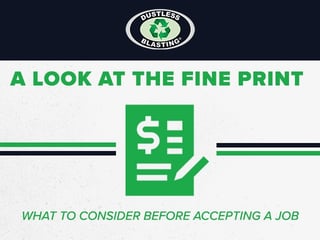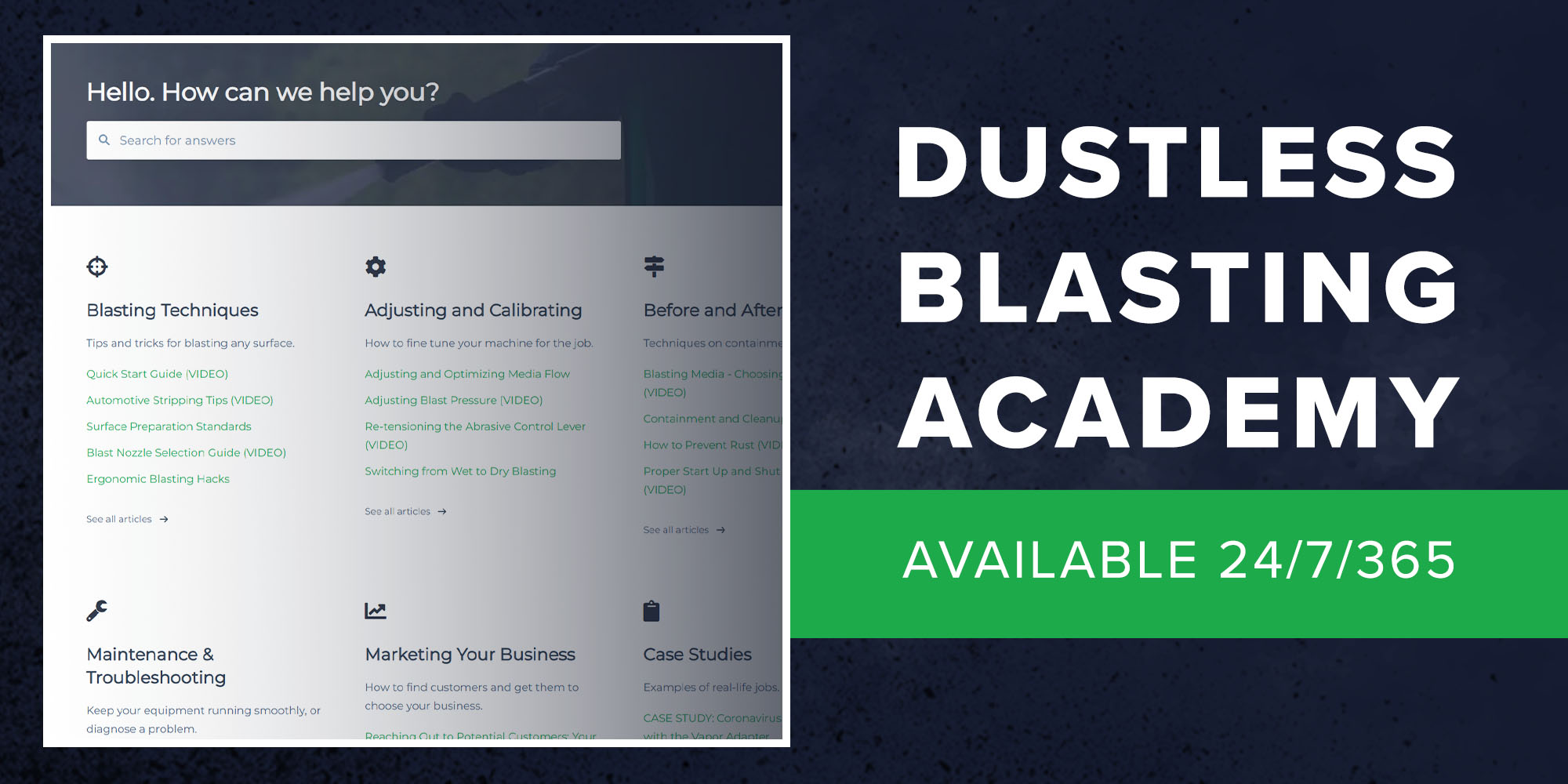
In the world of sandblasting, choosing the right contracts to undertake is just as crucial as it is in any other industry. While opportunities may abound, not all dustless blasting jobs are created equal. As a business owner, it's essential to discern which contracts are worth pursuing to ensure the growth of your business and uphold your professional reputation. In this blog post, we'll explore the factors you should consider when deciding whether a sandblaster contract is worth your time and resources.
Financial Analysis
Before signing a contract or taking a job, the number one question you may have is, Will I make a worthwhile profit? Before taking a job, scrutinize the contract's financial details, including proposed budget and payment terms. If you're generating a quote for your client, be sure your charged amount accounts for all estimated overhead, material, and transportation costs. Whether you're negotiating a contract or creating a quote, assess whether the budget accounts for your estimated costs and allows for reasonable profit margin.
Here's a few examples of potential costs to consider before taking a project:
-
Employee costs, from wages and workers' compensation to payroll tax and any insurance needs.
-
Wear and tear on your blast equipment
-
Materials and resources such as diesel, abrasive, rust inhibitor, and containment tools
-
Employee wages and costs
-
Taxes
-
Travel costs
-
Insurance
-
Time spent blasting and cleaning the job site (if necessary)
Prepare for potential cost overruns and unforeseen expenses. Underestimating costs, facing unexpected challenges or dealing with uncooperative clients can result in significant financial losses for your business.

Client Compatibility
While great customer service is a must for any business, it's okay to decline projects if the client isn't the best fit for you. Establish open and transparent communication with your potential customer, and determine whether the client's goals align with your blast expertise and capabilities. Evaluate their willingness to collaborate effectively throughout the contract and set clear expectations for the outcome of the project to keep everyone on the same page. If you and the customer are unable to come to an agreement on the stipulations of a job, it may be best to walk away and reserve your resources for a better suited project.

Project Scope and Complexity
Before committing to a project, analyze the scope and complexity of the job. Is the client looking for someone who can blast and paint? Do they expect you to complete cleanup, or will they hire a cleanup team separately? It's a good idea to do some research in your area to see what is typically expected for certain project contracts to make sure you're aligned with what others in the industry offer with their services. A great resource for industry research is our Facebook contractor group if you're already a machine owner, or our Online Academy for hundreds of hours of source material to help you make sure your business is in top shape.
Taking on contracts that don't align with your expertise or capacity can lead to subpar work, which may reflect poorly on your business. Ensure you possess the necessary equipment, skills, and personnel to complete the work to the client's satisfaction. Every project consumes your time, labor, and resources, and when a contract isn't profitable or within your project scope, these valuable assets may go to waste.
Timeline and Deadlines
When looking over the details of a job, examine the contract's timeline and deadlines. Verify you can allocate the required resources and manpower to meet the project's timeline without compromising quality. Once you have a preliminary timeline laid out, ensure you anticipate any potential delays and their impact on your business should these delays occur. Do your best to be realistic as to not over promise the speed of the project.
A great way to get a more accurate representation of your blast timeline is by doing a test blast. This is where you either blast a small patch of the requested item or simulate what the customer is asking to be blasted, such as paint on brick. With this process, you'll be able to fine tune blast pressure, media, and standoff distance for the most efficient and safe removal rate possible. Check out some common blast pressure and standoff guidelines in this Academy article.

Legal and Regulatory Compliance/Risk
Before committing to any job, check to make sure the contract complies with all relevant laws, permits, and regulations. Is there a potential for lead or mold? Are there specific media constrictions in the area you're blasting? Understand any legal liabilities associated with the project and address them accordingly. Conduct a thorough risk assessment to identify potential issues and complications, and evaluate your ability to mitigate and manage these risks effectively throughout the contract. No amount of profit is worth a potential lawsuit.
THe Big Picture
As with any business industry, not all contracts are equally advantageous, and it's vital to make informed decisions when considering new opportunities. Taking the time to evaluate potential job contracts comprehensively can shield your business from financial setbacks, resource depletion, and reputation damage. By considering factors like financial analysis, client compatibility, project scope, timeline, legal compliance, and risk assessment, you can make sound choices that lead to successful and rewarding jobs. Remember, it's about selecting the right contracts that align with your expertise and contribute to the growth and success of your Dustless Blasting business.
Looking for more tips on growing a successful Dustless Blasting startup? Check out our Online Academy!
